Physical Address
304 North Cardinal St.
Dorchester Center, MA 02124
Physical Address
304 North Cardinal St.
Dorchester Center, MA 02124
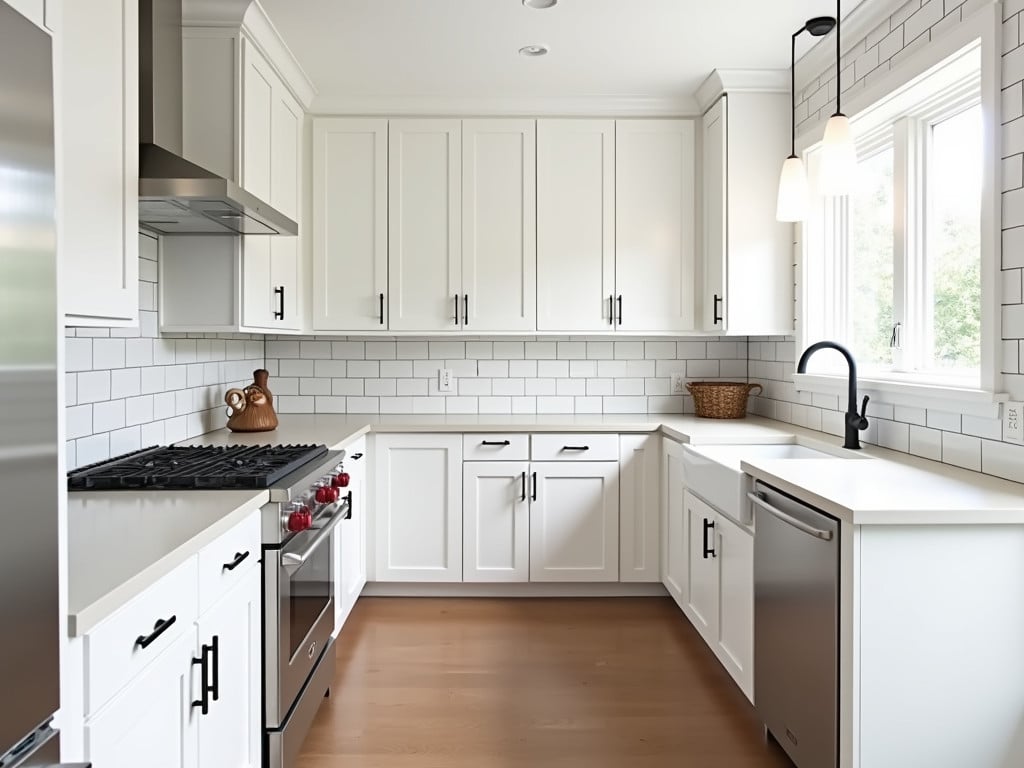
The relationship between white cabinetry and backsplashes has fascinated designers for generations. When the modern kitchen began taking shape in the early 20th century, White Cabinets emerged as a symbol of cleanliness and efficiency. Today, they serve as the perfect canvas for creative expression through backsplash design. Whether you’re renovating an outdated space or designing your dream kitchen, choosing the perfect kitchen backsplash with white cabinets can transform your space from simple to spectacular. Join me as we explore 24 stunning options that blend timeless elegance with contemporary innovation.
When the New York City subway system unveiled its iconic tiles in 1904, no one predicted they would revolutionize kitchen design. These simple 3×6 inch rectangular tiles have transcended their utilitarian origins to become a stunning complement to White Kitchen Cabinets. While traditional white grout creates a seamless look, dark grout can transform this classic into a contemporary statement, highlighting the geometric pattern while adding sophisticated depth.
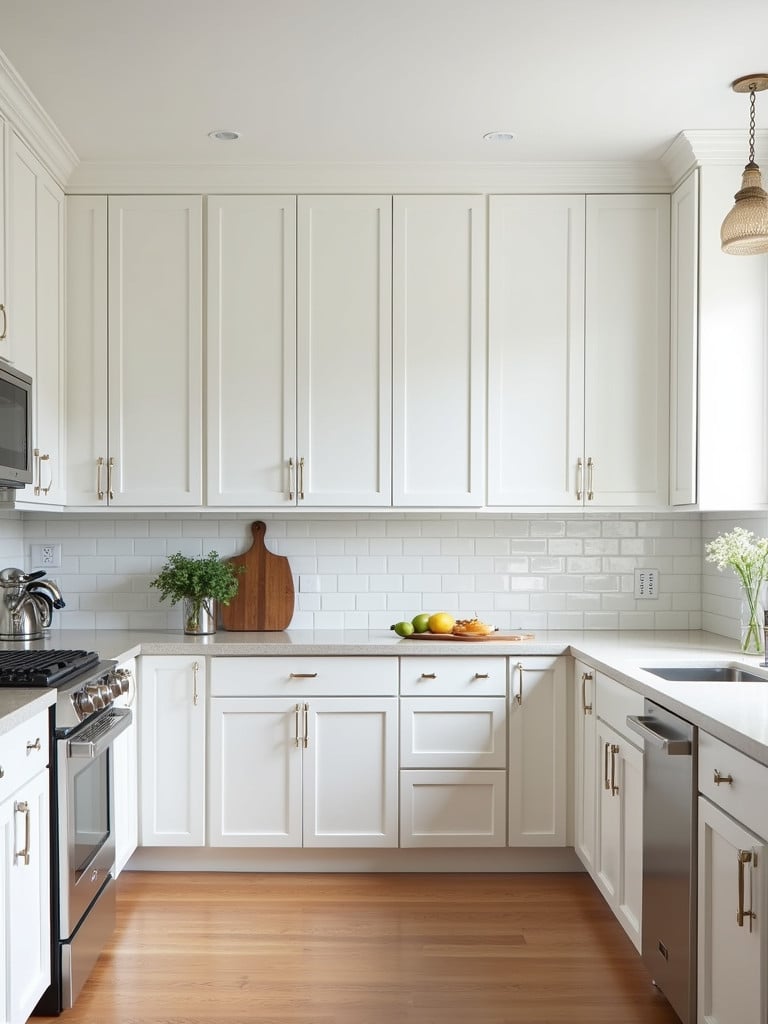
For those seeking to put their own spin on this enduring classic, consider breaking away from traditional horizontal installation. A vertical arrangement draws the eye upward, creating the illusion of higher ceilings. Installation precision is key – use spacers for even grout lines and apply quality sealant to protect against inevitable kitchen splashes. The beauty of subway tiles lies in their chameleon-like ability to adapt to any style, from traditional to modern.
Speaking of adaptability, while subway tiles offer clean lines and timeless appeal, those seeking an elevated level of luxury might want to consider our next option: the elegant marble slab backsplash.
Marble’s extraordinary journey from metamorphic rock to kitchen showpiece is a testament to its enduring appeal. When paired with white cabinets, a marble backsplash creates a symphony of whites and greys, each piece telling its own geological story through unique veining patterns. The natural variations in marble make it an unparalleled choice for creating a kitchen backsplash with white cabinets that feels both timeless and unique.
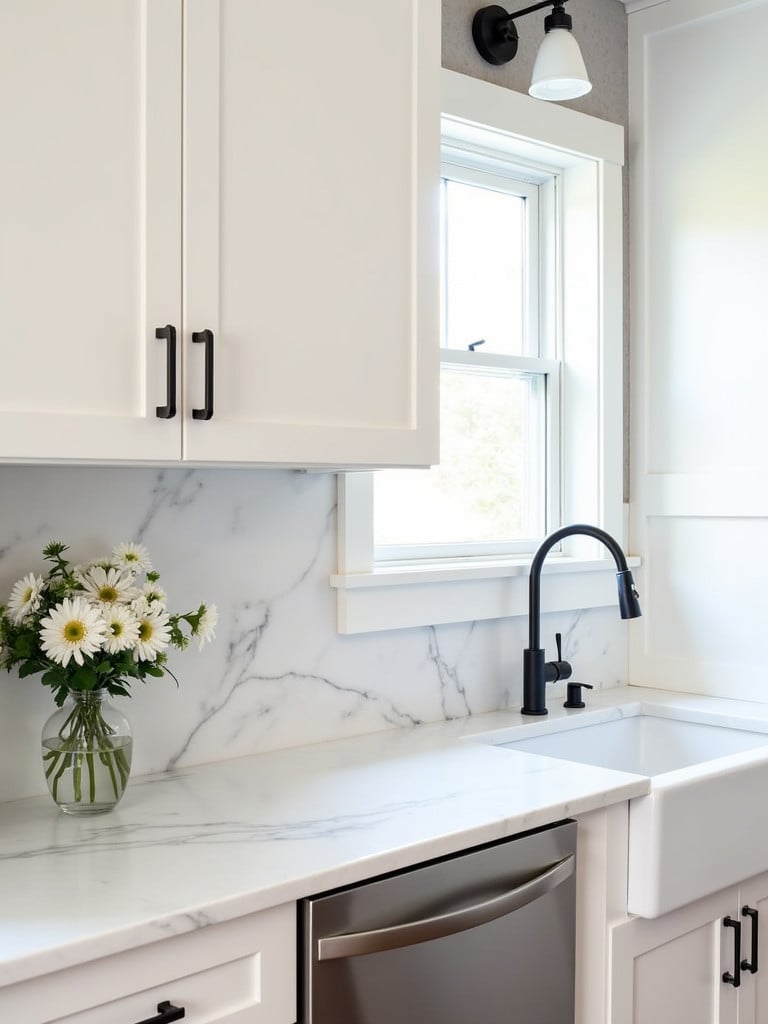 Herringbone Pattern Backsplash: A Pattern with Historical Pedigree” class=”wp-image-3726″/>
Herringbone Pattern Backsplash: A Pattern with Historical Pedigree” class=”wp-image-3726″/>Did you know the herringbone pattern takes its name from the skeletal structure of the herring fish? This ancient design motif has graced everything from Roman roads to medieval European parquets, and now it’s making a stunning statement in modern kitchens with white cabinets. The pattern creates a sophisticated interplay of light and shadow that adds depth without overwhelming the space, while its timeless appeal ensures your kitchen will never feel dated.
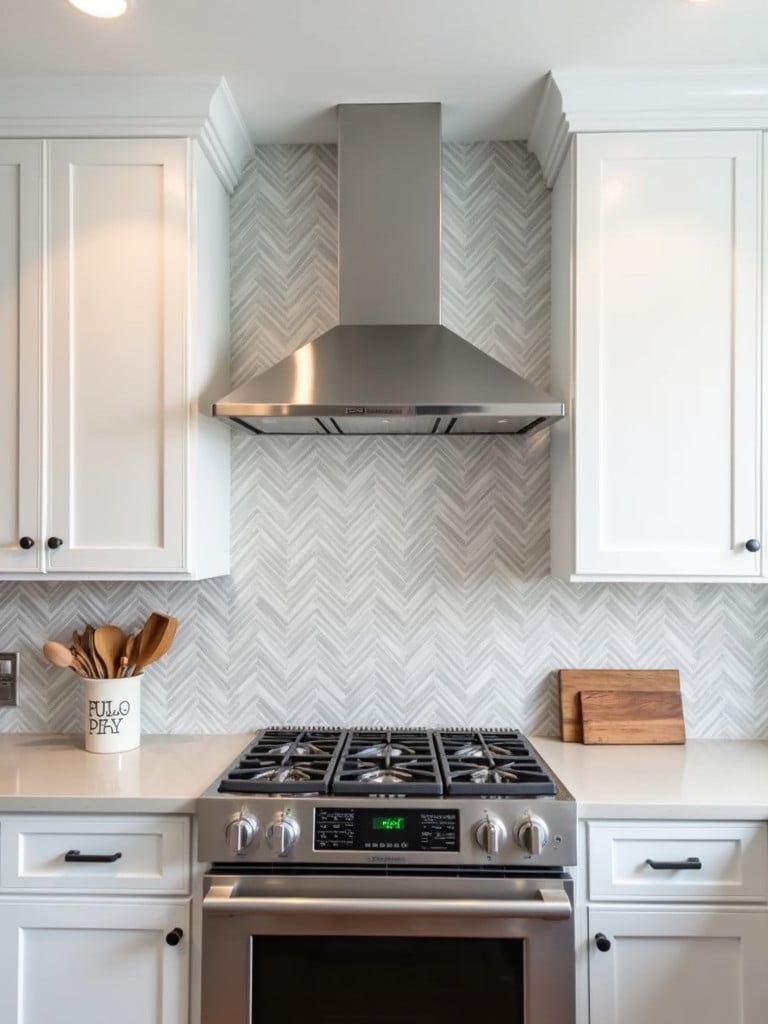
For those contemplating this elegant pattern, consider the transformative power of grout color. A contrasting grout emphasizes the distinctive zigzag pattern, while a matching grout creates a more subtle, textured appearance. Installation success lies in meticulous planning – start with a level line and work your way up, checking frequently to ensure the pattern remains straight. The result is a kitchen backsplash with white cabinets that draws the eye while maintaining clean, crisp aesthetics.
As we move from the structured elegance of herringbone to our next option, let’s explore how modern glass can create equally striking effects with a contemporary twist.
The evolution of glass in kitchen design has transformed from simple window panes to sophisticated design elements. Today’s glass tile backsplashes represent the perfect marriage of form and function, offering a non-porous, stain-resistant surface that reflects light and creates the illusion of more space – particularly valuable in smaller kitchens with white cabinets.
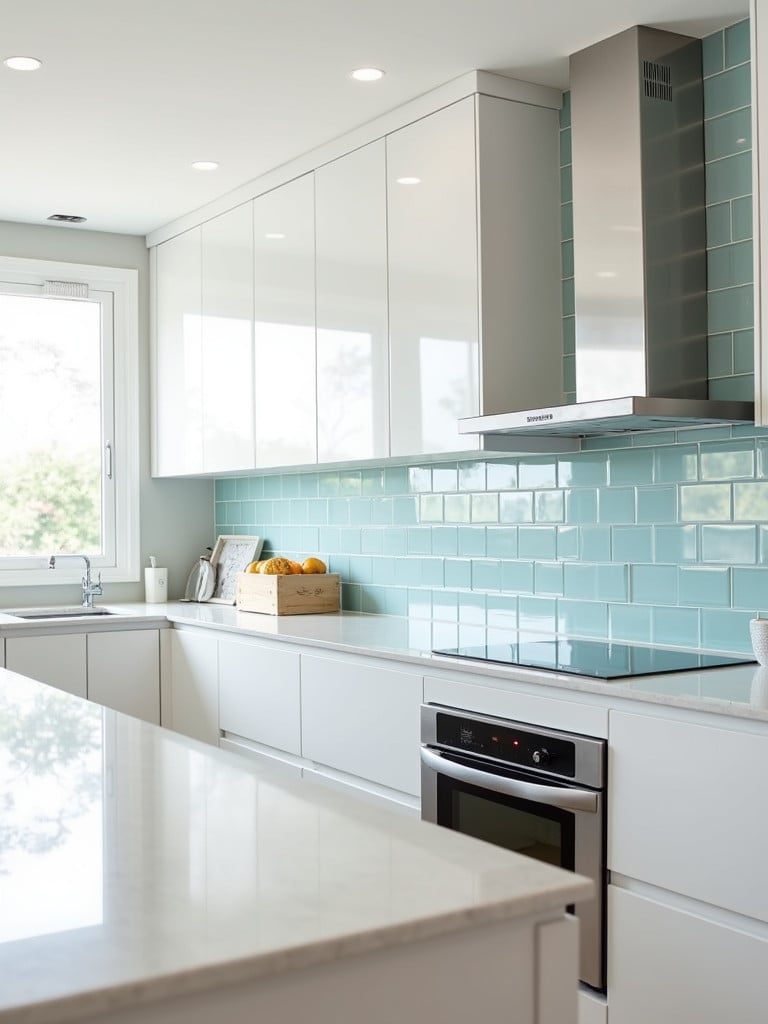
Glass Tiles interact with both natural and artificial light, creating a dynamic surface that changes throughout the day. Consider frosted glass tiles for a more subtle effect, or explore iridescent options that add a shimmer of color while maintaining the clean look that complements white cabinetry so well. For maintenance, a simple mixture of mild glass cleaner and a soft cloth is all you need to maintain their pristine appearance.
Speaking of texture and warmth, let’s explore how a rustic brick backsplash can create a stunning contrast with crisp white cabinets.
The use of exposed brick in kitchens dates back to early American industrial architecture, where functionality and durability were paramount. Today, incorporating a brick backsplash with white cabinets creates a compelling dialogue between raw, industrial elements and refined, modern design. The contrast adds unmistakable character while maintaining the clean aesthetic of your white cabinetry.

As we transition from the bold statement of brick to our next option, let’s explore how natural stone can provide similar texture with a more refined approach.
Throughout architectural history, natural stone has been revered for its unique ability to bring the organic world indoors. When paired with white cabinets, a textured stone backsplash creates an intriguing juxtaposition between polished precision and natural irregularity. Each piece of stone tells its own story, making every kitchen backsplash with white cabinets a unique composition.
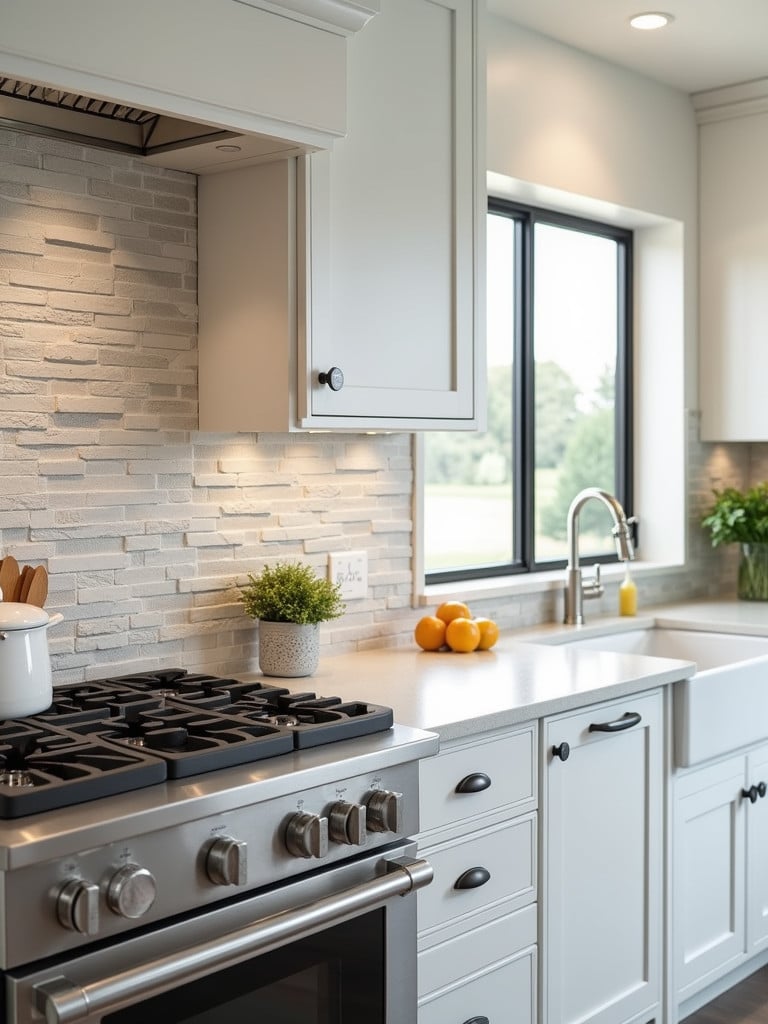
Natural stone backsplashes offer endless possibilities for creating dimension in your kitchen. Consider incorporating mixed stone sizes for added visual interest, or opt for a more uniform arrangement that lets the natural variations take center stage. Maintenance is key – apply a high-quality sealer to protect against water and stains, and keep a soft brush handy for cleaning those beautiful but challenging crevices.
Let’s explore how geometric patterns can create equally compelling visual interest through mathematical precision rather than natural variation.
The use of geometric patterns in interior design dates back to ancient civilizations, where mathematical precision was seen as a reflection of divine order. Today’s geometric tile backsplashes offer a contemporary take on this historical tradition, creating striking focal points that complement the clean lines of white cabinets.
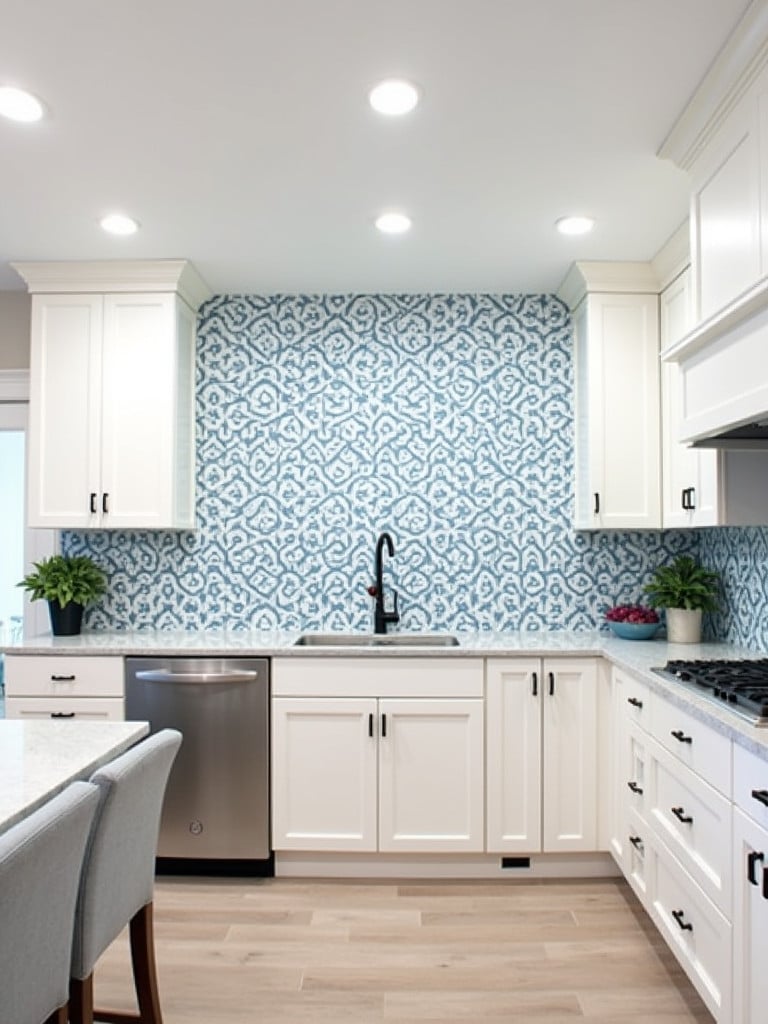
From precise geometry, let’s transition to the artisanal charm of our next option, where each tile tells its own unique story.
In an age of mass production, handpainted tiles stand as a testament to the enduring value of artisanal craftsmanship. Each tile is a unique piece of art, created through techniques passed down through generations. When paired with white cabinets, these tiles transform your kitchen into a gallery of functional art, creating a stunning kitchen backsplash with white cabinets that’s truly one-of-a-kind.
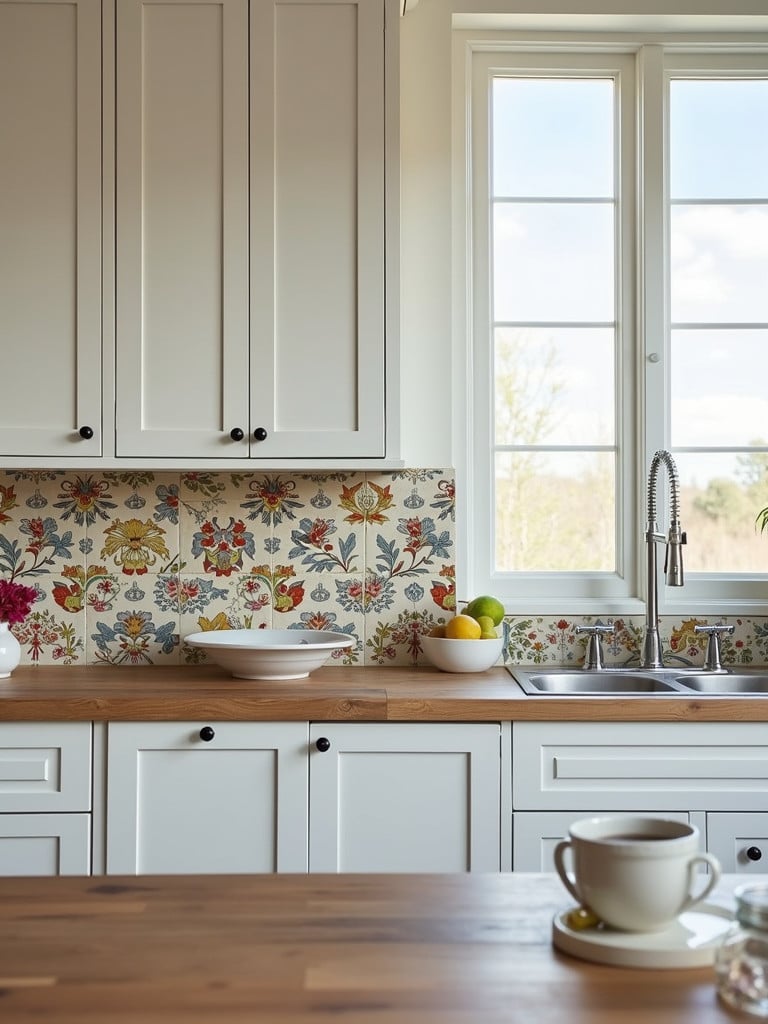
The penny tile’s journey from practical flooring choice in early 20th-century bathrooms to sophisticated kitchen backsplash material is a fascinating study in design evolution. These small, circular tiles offer a delightful counterpoint to the straight lines of white cabinets, creating visual interest through pattern repetition and scale contrast. Creating a gradient effect with different shades adds subtle drama, while contrasting grout can emphasize the distinctive circular pattern.
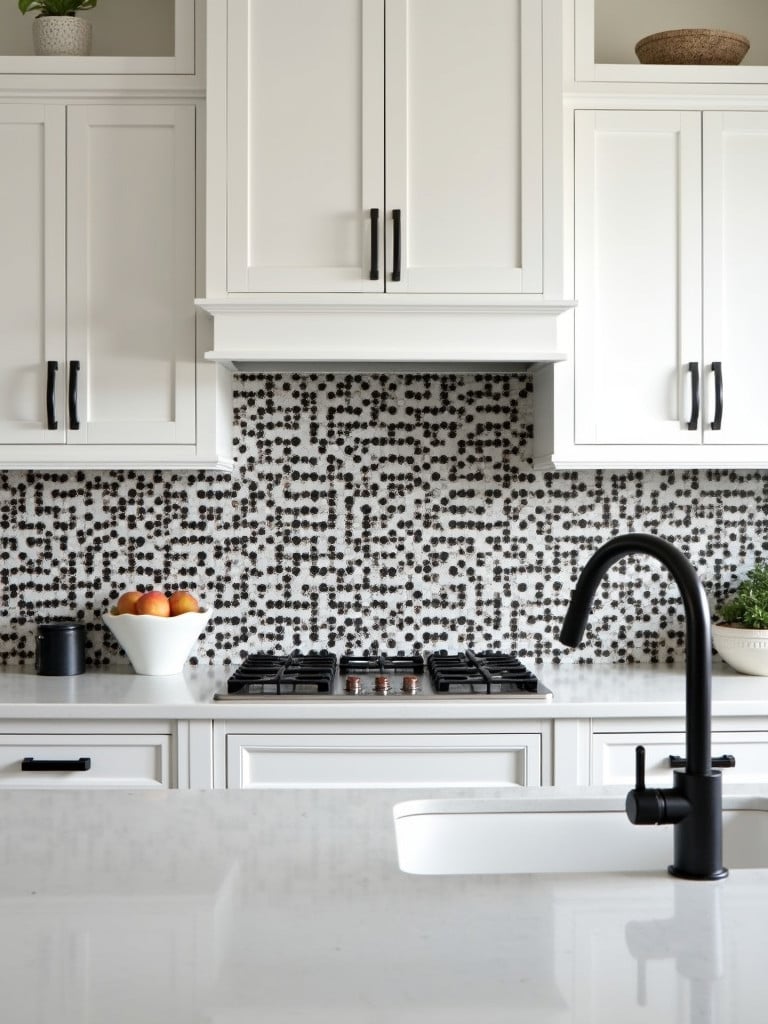
Installation requires precision – use a notched trowel for even thinset application and press penny tile sheets firmly to ensure proper adhesion. A kitchen backsplash with white cabinets featuring penny tiles creates a timeless look that bridges classic and contemporary styles.
From the delicate pattern of penny tiles, let’s explore how mirrored surfaces can transform your kitchen’s entire atmosphere.
The use of mirrors in interior design dates back to the Palace of Versailles, where they were used to amplify light and create the illusion of endless space. Today’s mirrored backsplashes serve a similar purpose, making even modest kitchens with white cabinets feel more expansive while adding a touch of glamour.
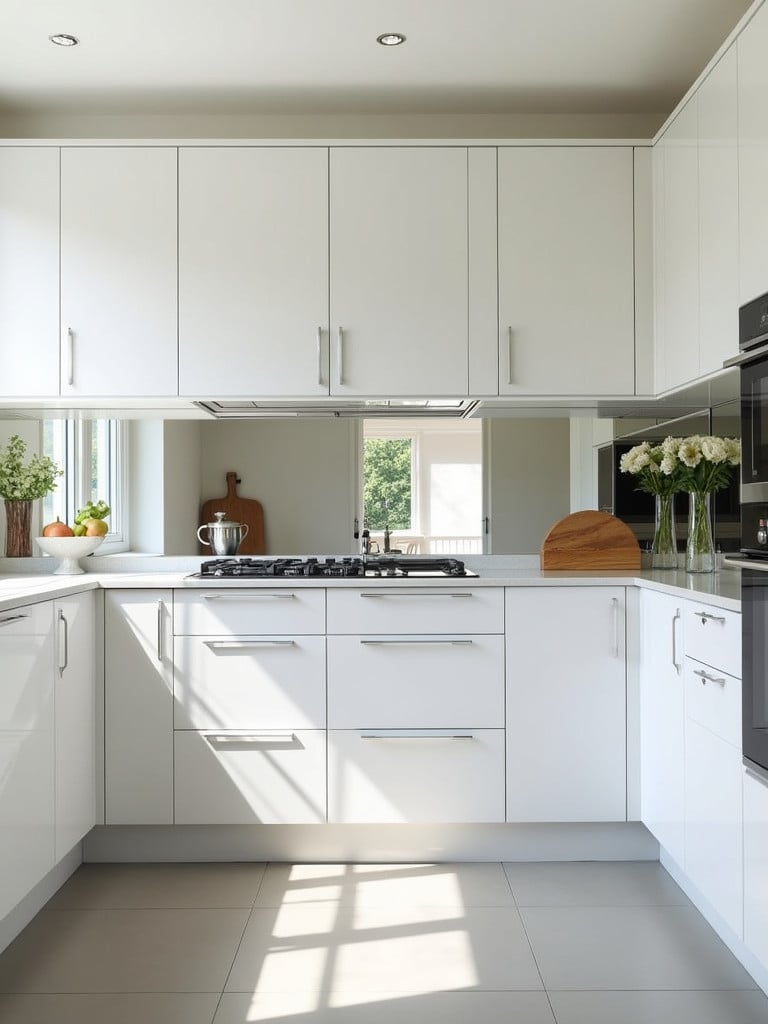
Consider the transformative effect of different mirror finishes – while clear mirror creates a bright, expansive feel, antiqued mirror adds depth and character while hiding fingerprints more effectively. Installation requires precision and the right materials; always use a high-quality mirror adhesive and ensure proper support.
As we shift from reflective surfaces to subtle patterns, let’s explore how understated designs can create equally impressive effects.
Some of the most enduring designs are those that whisper rather than shout. A subtle patterned tile backsplash paired with white cabinets exemplifies this principle, offering visual interest without overwhelming the space. Tone-on-tone patterns create sophisticated depth while maintaining the clean aesthetic that makes white kitchens so appealing.
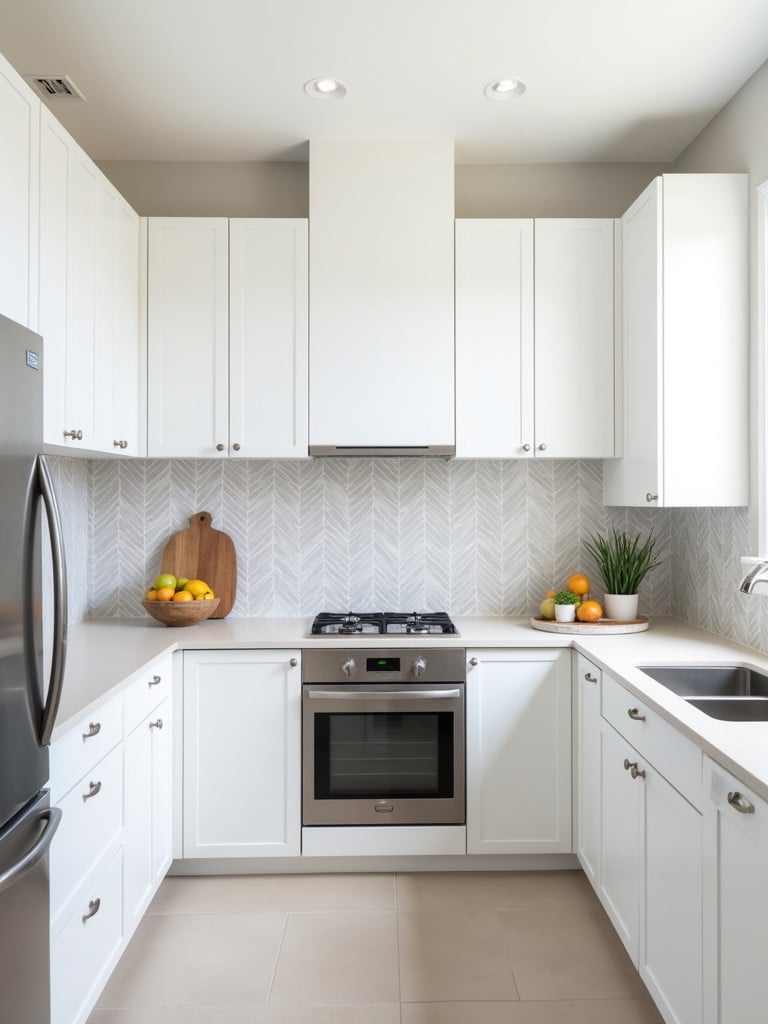
Originally used in shipbuilding and early American architecture, shiplap has evolved into a versatile design element that brings warmth and character to contemporary kitchens. When paired with white cabinets, a shiplap backsplash creates a cohesive look that honors traditional craftsmanship while meeting modern needs. The clean lines of a kitchen backsplash with white cabinets take on new depth when interpreted through this classic material.

Proper sealing and maintenance make wood entirely feasible in kitchen applications. Apply multiple coats of water-resistant sealant and maintain small, traditional gaps between boards for authentic character. Whether painted white to blend with cabinets or stained to add warmth, shiplap creates a timeless backdrop that works beautifully in both modern farmhouse and transitional kitchens.
Let’s shift from rustic charm to vibrant expression with our next colorful option.
The art of mosaic dates back to ancient civilizations, where artisans created elaborate designs from small pieces of glass, stone, and ceramic. Today’s mosaic tile backsplashes continue this rich tradition while offering modern convenience through mesh-backed sheets. When combined with white cabinets, colorful mosaics create a stunning focal point that can define your kitchen’s entire character.
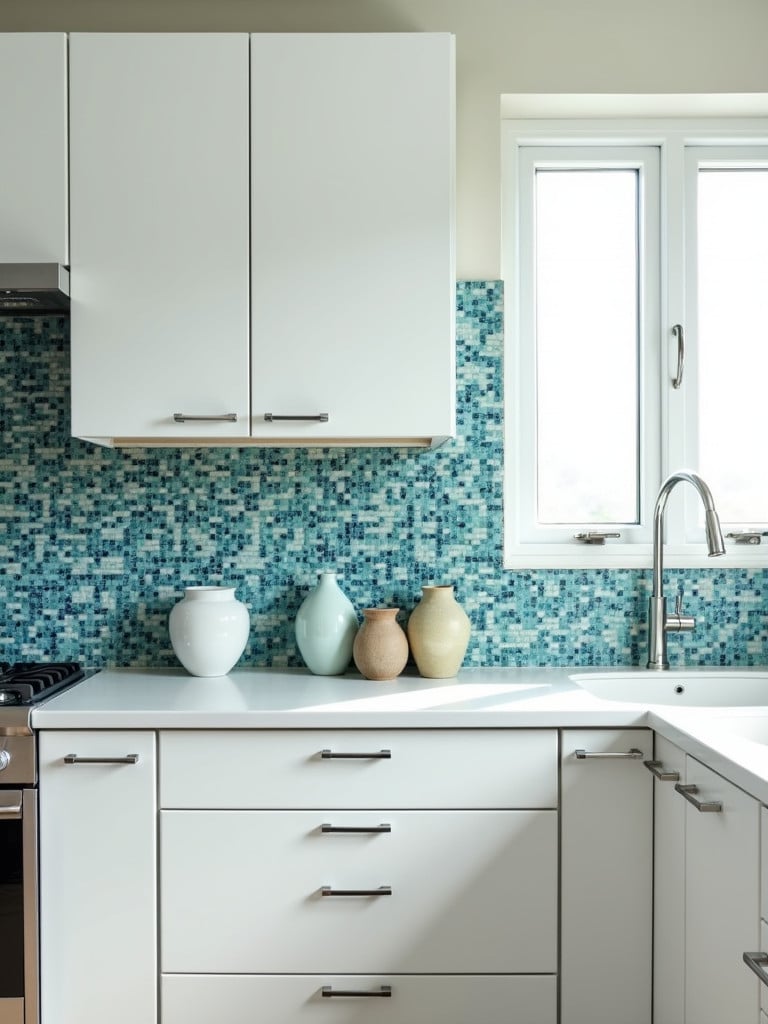
From artistic expression to industrial elegance, let’s explore how stainless steel can bring professional-grade style to your home.
The integration of stainless steel in kitchen design emerged from professional kitchens, where durability and cleanliness were paramount concerns. When paired with white cabinets, a stainless steel backsplash creates a sophisticated, contemporary look that references this professional heritage while adding modern polish to your home kitchen.
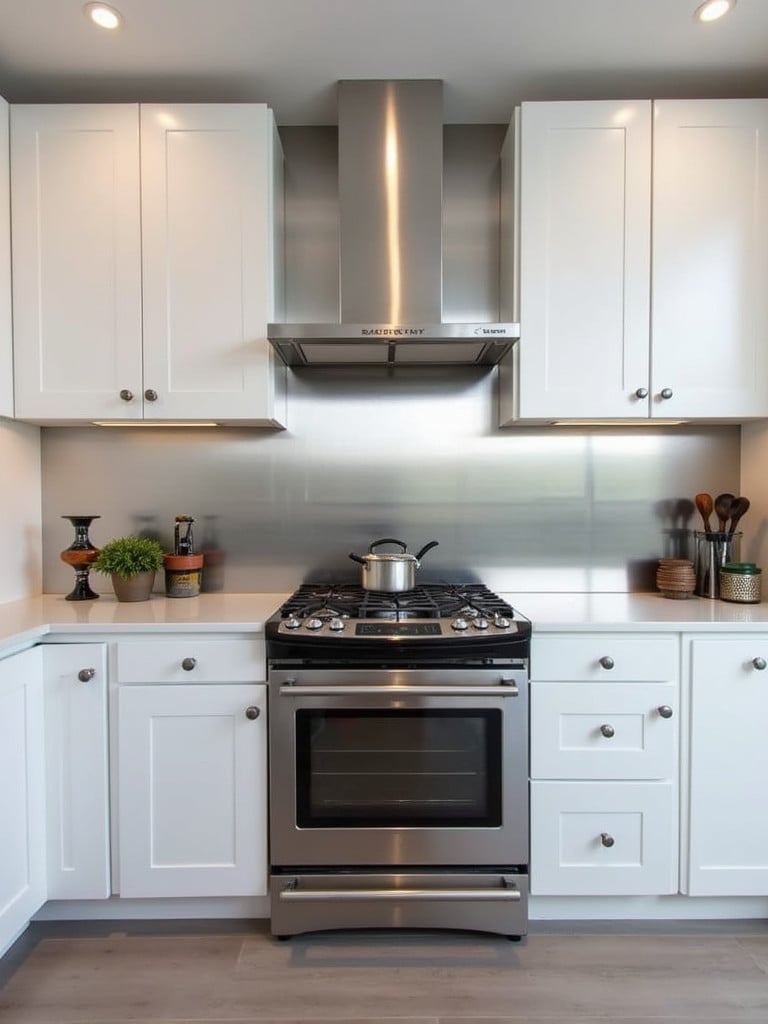
The history of beveled tiles traces back to Victorian-era architecture, where they were prized for their ability to capture and reflect light in interesting ways. A kitchen backsplash with white cabinets takes on new dimension when created with beveled edge tiles, as their cut edges create subtle shadows and highlights that change throughout the day as natural light shifts.
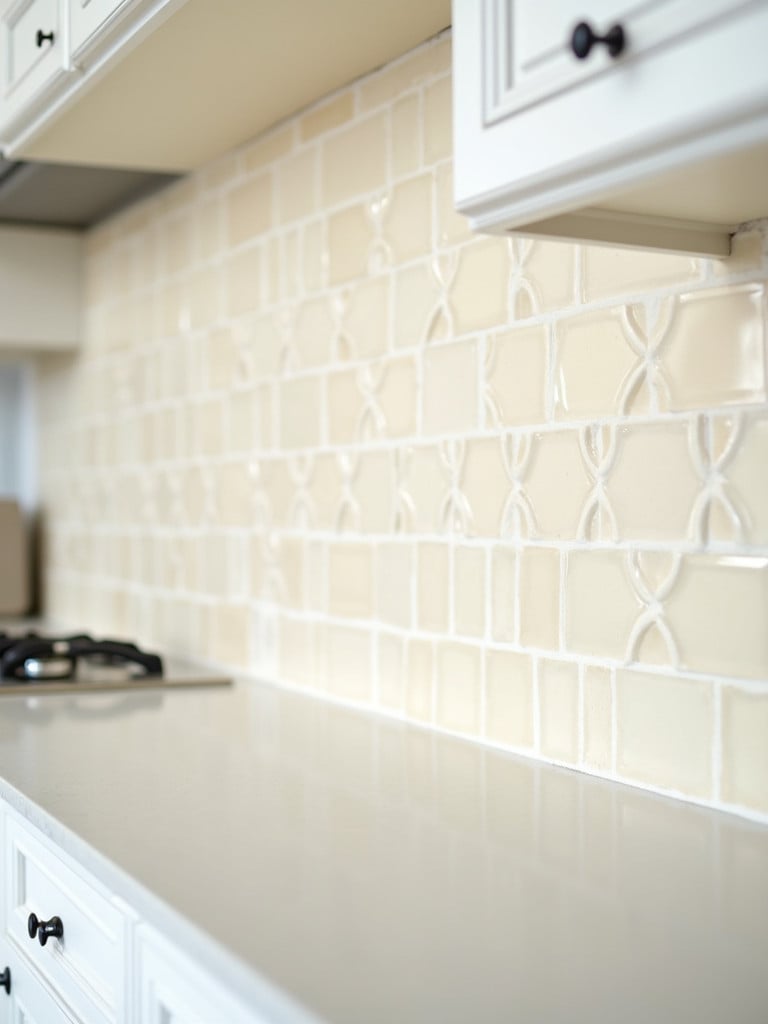
While often used in subway tile formations, the beveled edges add an extra layer of visual interest that elevates the classic look. Consider using a darker grout to highlight the dimensional quality of the tiles, or match the grout color for a more subtle, sophisticated look. Proper spacing is crucial – use tile spacers to ensure consistent grout lines that enhance rather than detract from the beveled effect.
From subtle dimension, let’s explore how centuries-old Moroccan patterns can bring exotic flair to your kitchen.
The intricate geometric and floral patterns of Moroccan tiles tell stories of ancient craftsmanship and mathematical precision. When combined with white cabinets, these tiles create a stunning focal point that manages to feel both timeless and thoroughly modern. The result is a kitchen backsplash with white cabinets that serves as a conversation piece while adding cultural richness to your design narrative.
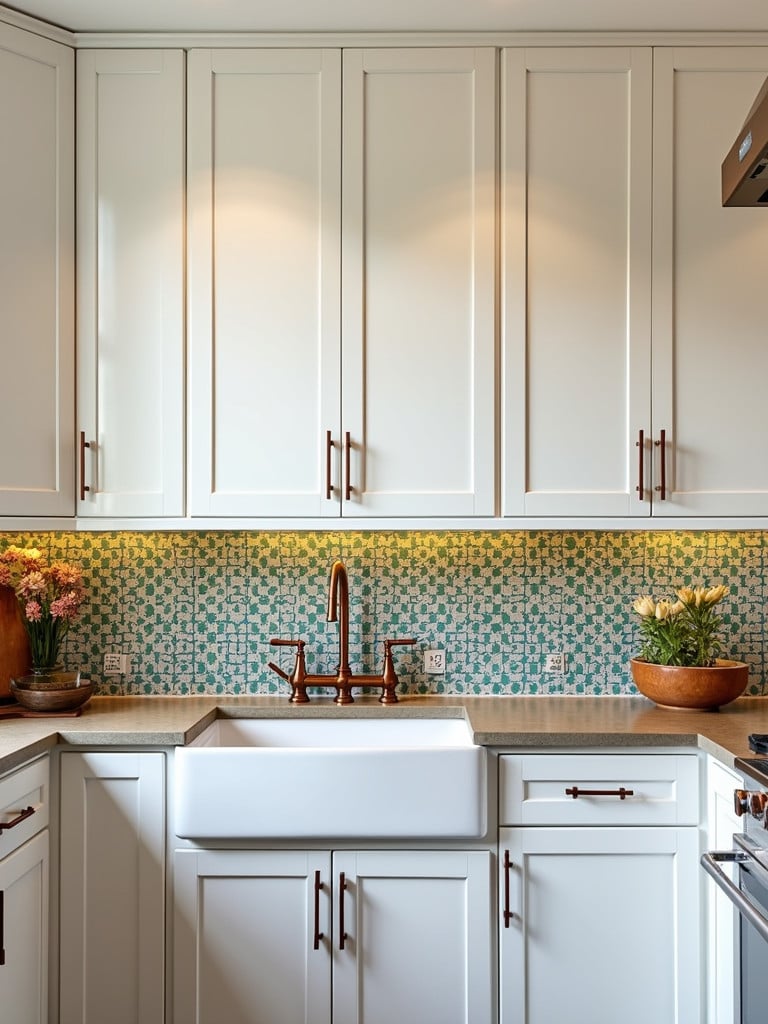
Let’s transition from ornate patterns to explore how natural wood can bring organic warmth to your space.
While wood might seem an unconventional choice for a kitchen backsplash, its use actually dates back to early American farmhouse kitchens. Today’s sealed and treated wood backsplashes offer a perfect complement to white cabinets, bringing natural warmth and texture while maintaining practicality. The combination creates a welcoming atmosphere that balances modern cleanliness with organic charm.
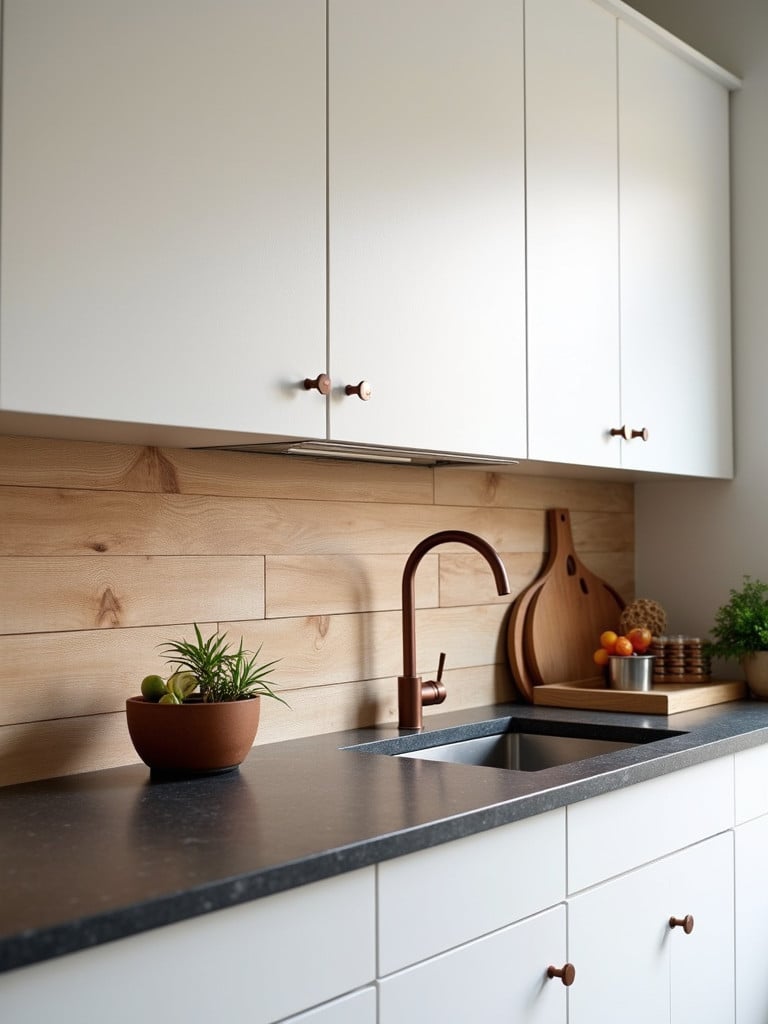
The use of concrete in residential design emerged from the Brutalist architecture movement, where raw materials were celebrated for their honest expression. Today’s concrete backsplashes offer a sophisticated take on industrial style that pairs beautifully with white cabinets. The material’s natural variations create depth while maintaining a clean, contemporary aesthetic that makes for a striking kitchen backsplash with white cabinets.
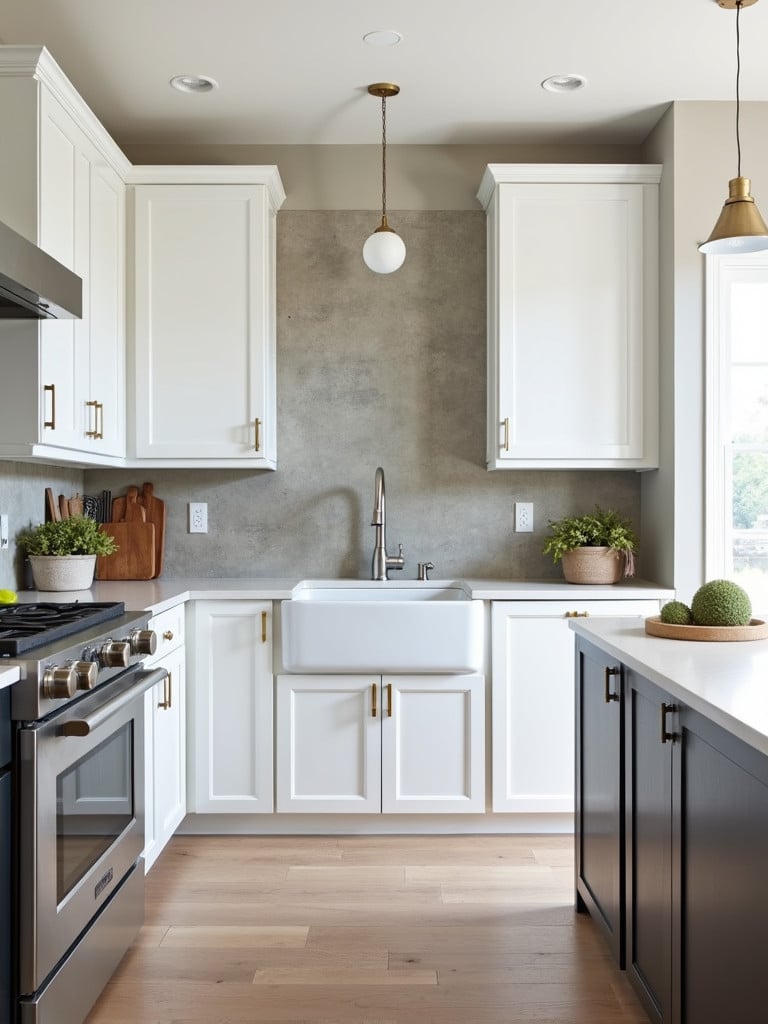
Modern concrete can be tinted, textured, or polished to achieve various looks, from sleek and smooth to intentionally distressed. The key to success lies in proper sealing – apply a high-quality concrete sealant with a low-pile roller to protect against staining and water damage while maintaining the material’s natural beauty.
From industrial minimalism to expansive elegance, let’s explore how large format tiles can create a similar sense of sophistication.
The trend toward large format tiles represents a significant shift from traditional backsplash design. When paired with white cabinets, these tiles create a sense of visual calm while making smaller kitchens appear more spacious thanks to fewer grout lines. The clean look perfectly complements modern kitchen designs while offering practical benefits like easier cleaning.
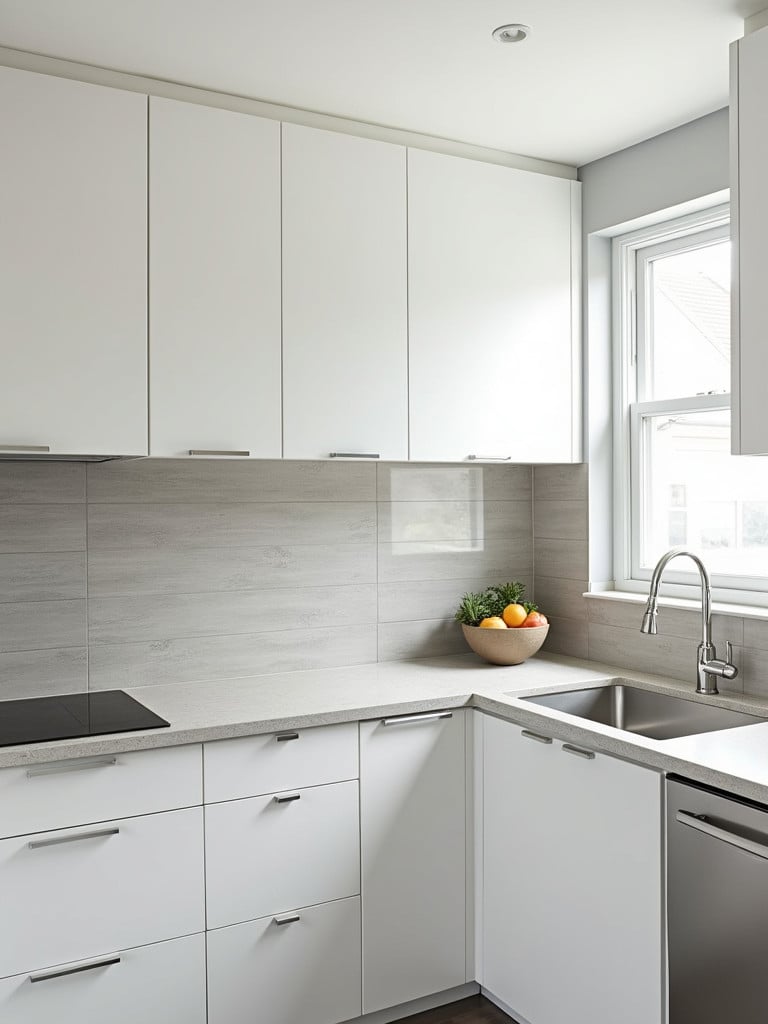
From modern simplicity to traditional elegance, let’s explore the timeless appeal of arabesque tiles.
The graceful curves of arabesque tiles tell a design story that spans centuries and continents. Inspired by Moorish architecture, these elegant forms bring a touch of romance and sophistication to contemporary kitchens. When combined with white cabinets, arabesque tiles create a perfect balance between classical beauty and modern simplicity.
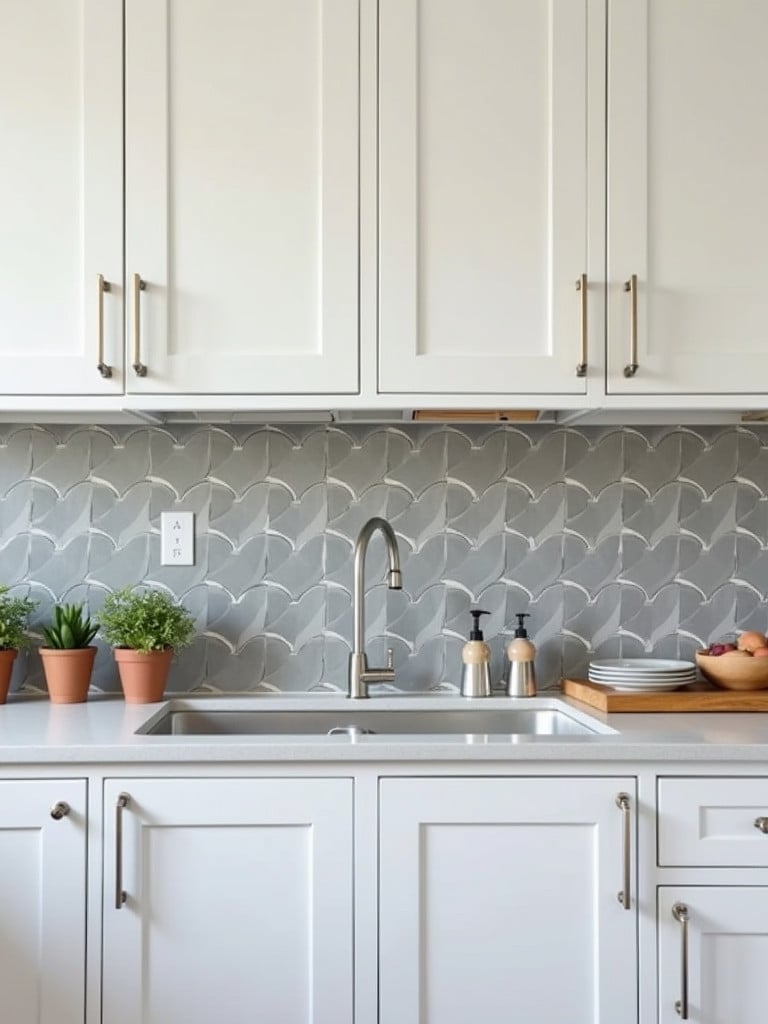
Modern manufacturing techniques have given rise to an exciting new category of backsplash options that add literal depth to your kitchen design. When paired with white cabinets, 3D tiles create fascinating shadow play that changes throughout the day as natural light shifts across the surface. The result is a kitchen backsplash with white cabinets that engages both visually and tactilely.
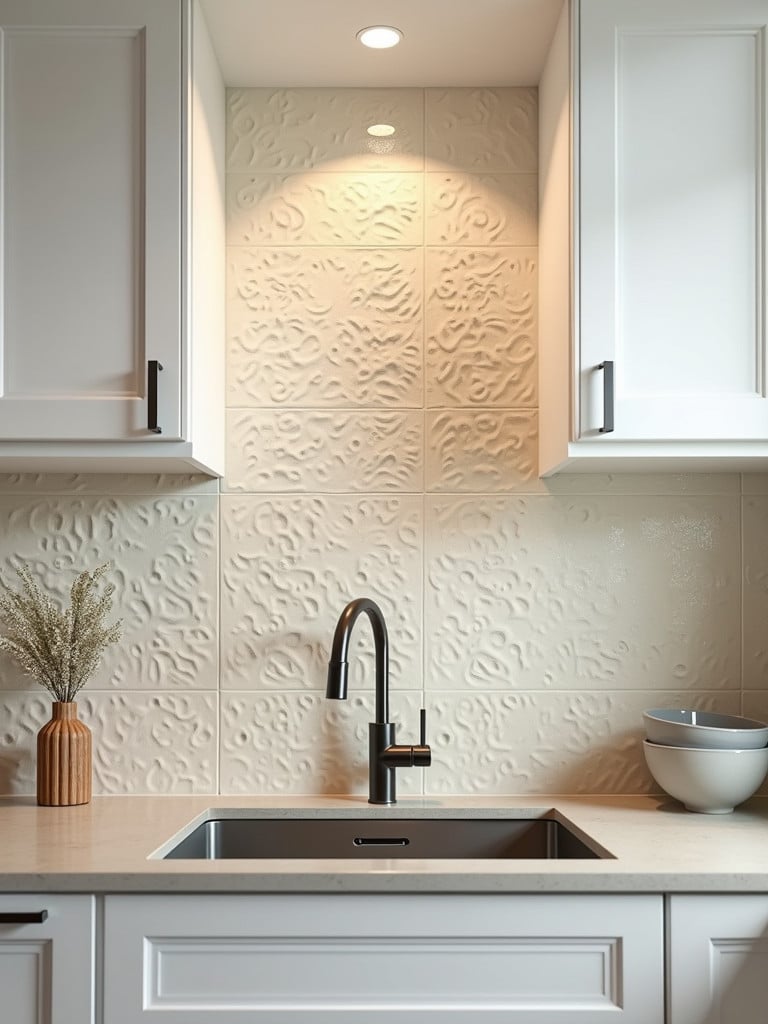
Installation requires special consideration for both adhesion and cleaning. Use a thick-set mortar to ensure proper support for the raised elements, and take extra care during grouting to avoid residue in the textural elements. Whether you choose geometric patterns for a modern statement or gentle waves for a more organic feel, these tiles create unique lighting effects through their shadows and highlights.
From modern dimension to traditional craftsmanship, let’s explore the timeless appeal of encaustic cement tiles.
The art of creating encaustic cement tiles dates back to medieval Europe, where each tile was carefully handcrafted using colored cement in intricate patterns. Unlike surface-glazed tiles, these patterns run through the entire tile, resulting in designs that can last for generations. When paired with white cabinets, these tiles bring authenticity and warmth that mass-produced alternatives simply can’t match.
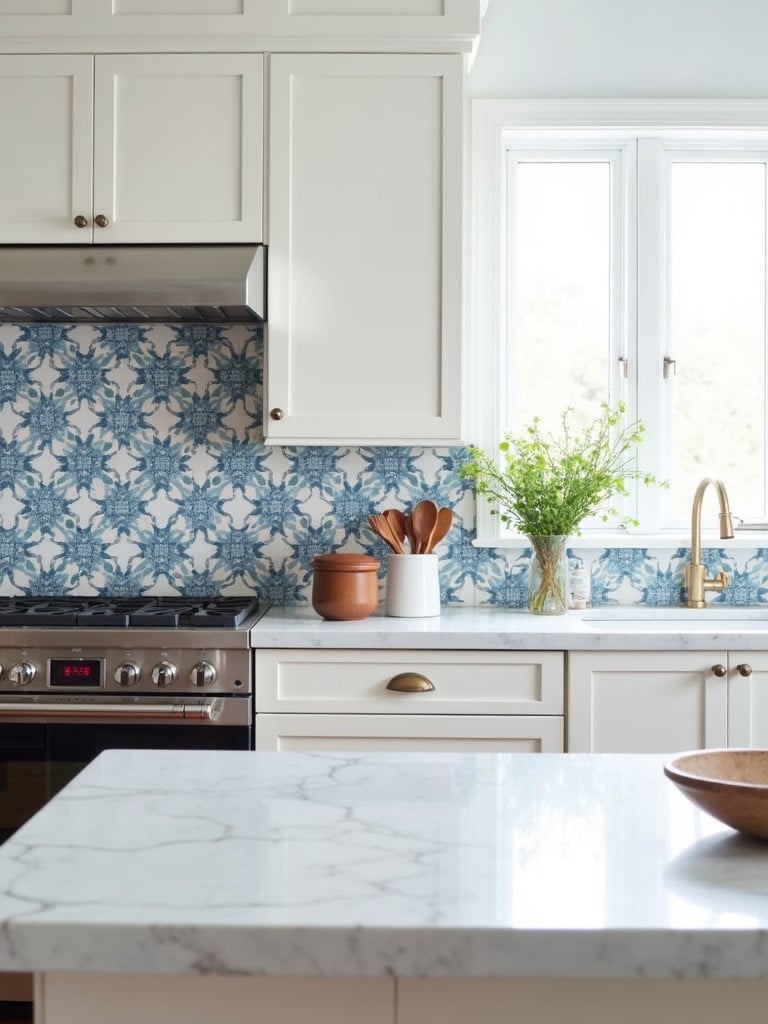
Let’s transition from artisanal patterns to nature’s own artistry with our next option.
There’s something inherently soothing about bringing elements from nature into our living spaces. Creating a kitchen backsplash with white cabinets using pebble tiles provides a fascinating textural contrast to smooth surfaces while adding a spa-like feeling to your kitchen. The variation in pebble sizes and colors creates a naturally random pattern that’s both visually interesting and remarkably grounding.
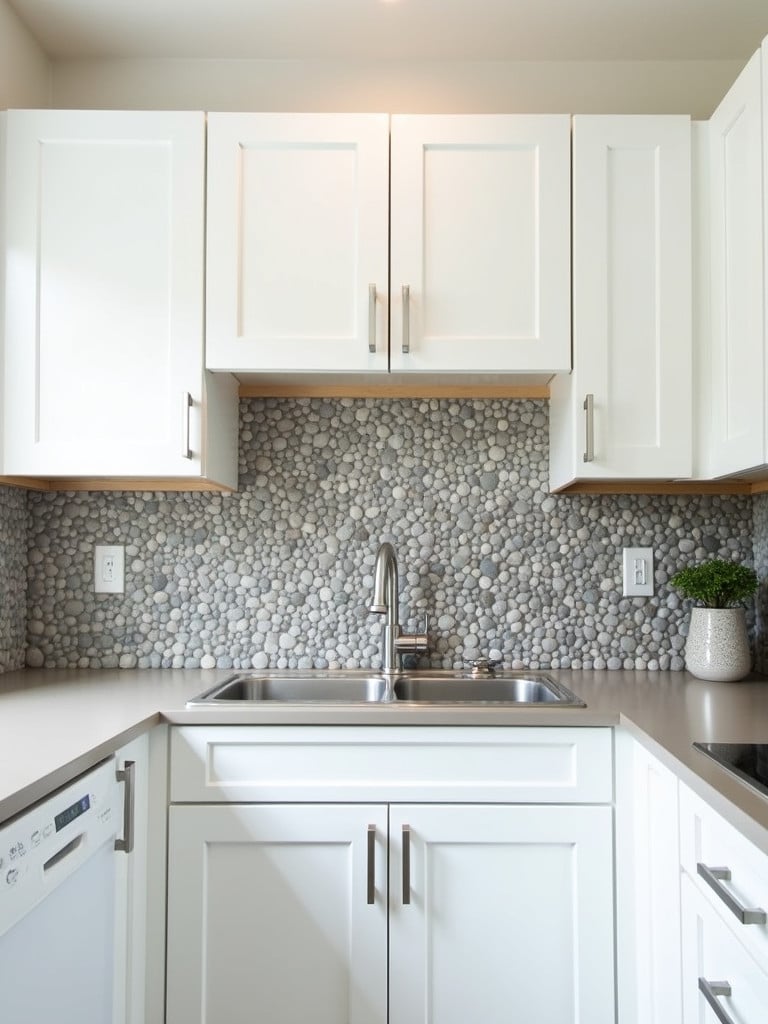
For our final option, let’s explore how engineered materials can provide the perfect blend of beauty and function.
As we conclude our exploration of backsplash options, we turn to quartz, a material that represents the perfect marriage of form and function. Unlike natural stone, quartz backsplashes offer consistent patterning and superior durability, while still providing the elegant look that complements white cabinets so beautifully. The non-porous nature of quartz makes it exceptionally practical for kitchen applications, resisting stains and requiring minimal maintenance.
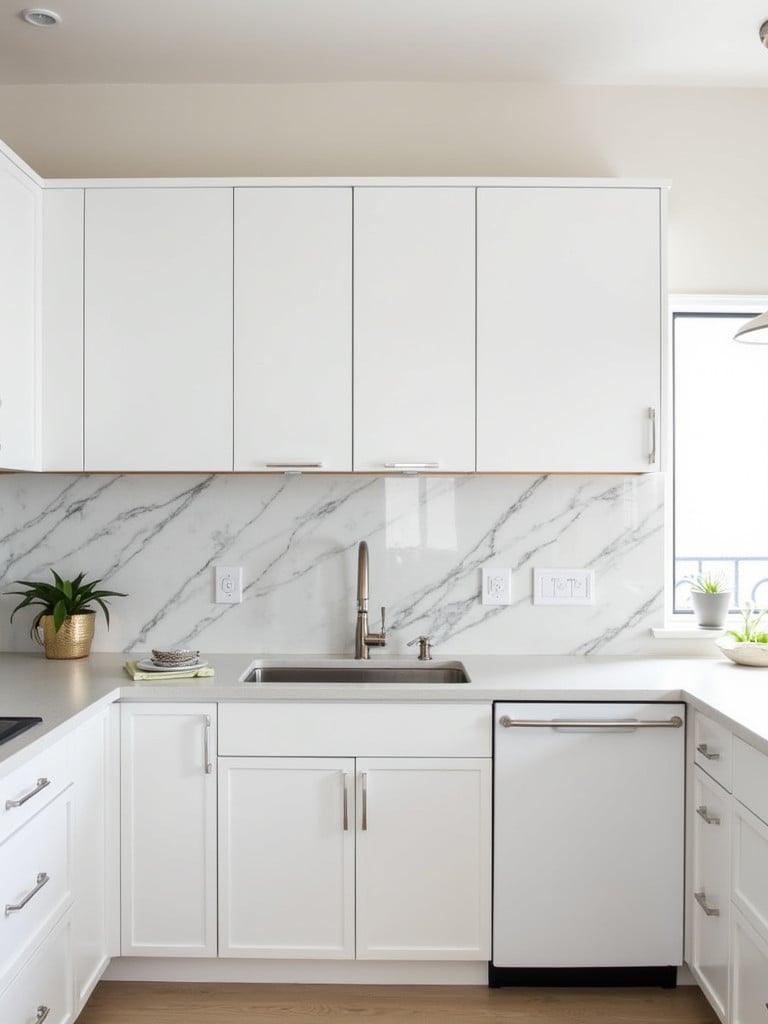
Conclusion: The perfect backsplash for your white kitchen cabinets is one that balances your personal style with practical considerations. Whether you choose the timeless appeal of subway tiles or the bold statement of geometric patterns, remember that your backsplash is more than just a practical surface – it’s an opportunity to add character and charm to your kitchen’s design narrative. With proper installation and maintenance, any of these options can transform your kitchen into a space that’s both beautiful and functional for years to come.